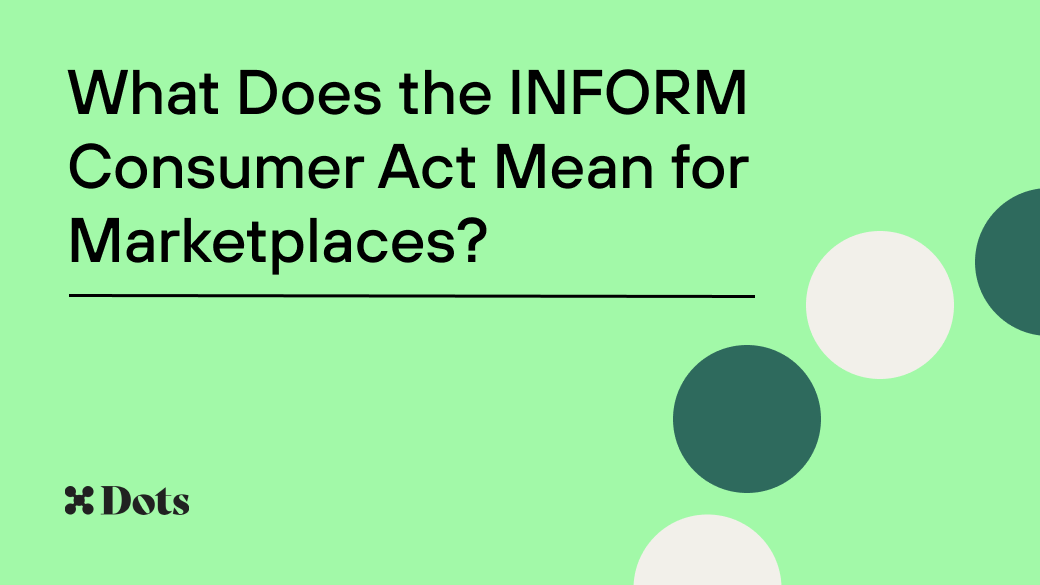What Marketplaces Need to Know About the INFORM Consumer Act
A new law is fighting online fraud. Is your marketplace ready for the INFORM Consumers Act? Read our guide and know how to stay compliant and avoid huge fines.

What is the INFORM Consumer Act?
The INFORM Consumer Act, which stands for Integrity, Notification, and Fairness in Online Retail Marketplaces for Consumers, was passed December 29, 2022 as an addendum to the Consolidated Appropriations Act of 2023 bill. This new act applies to online marketplaces defined as any business that conforms to “consumer-directed” platforms that “facilitate or enable third party sellers to engage in the sale, purchase, payment, storage, shipping, or delivery of a consumer product.”
What does it require?
The INFORM Act is enforced by the Federal Trade Commission (FTC) and requires compliance in multiple areas of marketplace operations. In summary, marketplaces are required to collect, verify, and make available seller information to consumers through product listing identification information on “high-volume third party sellers” on platform within 10 days of seller meeting transaction and revenue volume threshold.
Find a detailed explanation of each requirement below.
A Breakdown
“High-volume, third-party sellers include online marketplace participants that conduct 200 or more transactions resulting in total revenues of $5,000 or more during a continuous 12-month period. Online marketplaces must acquire these sellers' (1) bank account numbers, (2) government-issued identification, (3) tax identification numbers, and (4) contact information. Online marketplaces must verify this information and annually certify any changes to it.”
1) Seller Diligence Requirements
First, online marketplaces need to collect high-volume seller information and bank account information within 10 days of a seller qualifying as “high-volume third party seller.” Next, marketplaces need to verify the information received within 10 days and suspend the seller account if the information is not received or cannot be verified. Marketplaces also need to ensure annual collection of seller certifications to verify the continued accuracy of seller information reported.
- Seller name
- Email address
- Phone number
- Tax Identification Number
- Banking Account Information*
*This can be collected by marketplace or by ‘“payment processor or other third party contracted by the online marketplace to maintain such information, provided that the online marketplace ensures that it can obtain such information within 3 business days (. . .) ”
2) Seller Account Suspension Regulations
If requested information and certifications are not provided by the seller within 10 days of request by marketplace, the seller's account must be suspended promptly.
3) Data Security Requirements
Online marketplaces need to implement measures to securely store sensitive seller information such as SSN, address, bank account information. You can partner with privacy partners that allow you to utilize tokenization and encryption processes to store data, but the easiest way to facilitate a seamless collection and data storage process is to work with a payment API like Dots that already maintains the highest security standards in place to prevent data breaches.
When you use a secure payout API like Dots, all the security and privacy measures, including tokenization and encryption, will be implemented without you having to develop any new processes on your end.
4) Suspicious Activity Reporting Requirement
Online marketplaces are required to provide customers with methods to report electronically or by phone any suspicious activity or seller they encounter on the marketplace. This means that businesses need to feature a clear reporting option on the marketplace's product listing page that allows customers to report any high-volume third party sellers on the site.
5) Seller Information Disclosure Requirements
For sellers with $20,000 or more annual revenue from their marketplace transactions, marketplaces must disclose their information to customers.
6) Updated Platform Terms of Service & Agreements
Marketplaces must update their platform agreements and terms of service on their website to reflect any changes implemented to comply with the INFORM Consumer Act's requirements.
- Privacy Policies
- Payment Proecssor Terms
- Purchase Terms
What happens if you don’t comply?
If businesses are found to be noncompliant, civil actions can be taken against online marketplaces by state attorney generals. Any violations are subject to statutory civil penalty with fines being $46,517 per violation.
What are the challenges to compliance?
The timing of collecting and verifying information can cause significant delays and challenges for marketplaces. Businesses need to ensure that identification and bank information is collected within 10 days, in addition to suspending sellers who fail to submit information and certifications within 10 days. If these actions are not taken within 10 days, marketplaces can be subject to significant fines as described above.
Therefore, businesses should consider implementing payment processors that automatically collects seller information and implements high data security measures in order to streamline their compliance to the INFORM Consumer Act.
If you're looking for a highly-secure and automated payouts partner, the Dots API is a great solution. Dots has various privacy measures in place such as tokenization and encryption through third-party privacy partners to ensure the highest security for any collected seller data. Dots is already compliant with KYC, KYB requirements under the Anti-Money Laundering regulations which are more stringent than security requirements suggested for the INFORM Consumer Act.
How does this law affect marketplace owners?
While the INFORM Consumer Act was passed to protect both businesses and consumers, there are potential risks that arise with the various requirements marketplaces need to follow.
- Data security risks: storing sensitive seller data may require additional cybersecurity and data-privacy enhancement measures
- Liability risks: potentially uncovering unlawful sellers and transactions
- Inaccurate seller data verification: variety of methods such as taxpayer identification matching, manual inspection of documents
- Increased operational burden/time
- Difficulty in manual collection of data
Using a payment processor like Dots that automates data collection following KYC, KYB, and INFORM Consumer Act regulation requirements can be a simple way to significantly reduce risks faced with compliance. The Dots API automatically collects necessary information to comply including name, bank account information, tax information while maintaining the highest level of data security and privacy. Dots also verifies any collected seller information automatically through 2-step verification and data matching to take the burden off of your business to manually verify seller documents.
When should marketplaces act by?
Online marketplaces are expected to comply and implement all necessary changes by June 27, 2023.
A Brief Summary
To summarize, the recently passed INFORM Consumer Act has multiple requirements that online marketplaces will need to follow to be compliant. These requirements can be summarized in 6 parts:
The INFORM Consumer ACT
- Seller Diligence Requirements
- Seller Account Suspension Requiremets
- Data Security Requirements
- Suspicious Activity Reporting Requirement
- Seller Information Disclosure Requirements
- Updated Platform Terms of Service & Agreements
As a reminder, marketplaces need to collect the information below from each seller:
- Seller name
- Email address
- Phone number
- Tax Identification Number
- Banking Account Information
And to review, here are the top risks to consider as a marketplace acting in compliance with the new act:
- Data security risks: storing sensitive seller data may require additional cybersecurity and data-privacy enhancement measures
- Liability risks: potentially uncovering unlawful sellers and transactions
- Inaccurate seller data verification: variety of methods such as taxpayer identification matching, manual inspection of documents
- Increased operational burden/time
- Difficulty in manual collection of data
Get Compliant With Dots Today
If you're looking for a hassle-free and efficient way to comply with the new INFORM Consumer Act for online marketplaces, partner with Dots. The Dots API automates seller information collection and verification, and ensures the highest security for your seller data with the latest cybersecurity measures.
